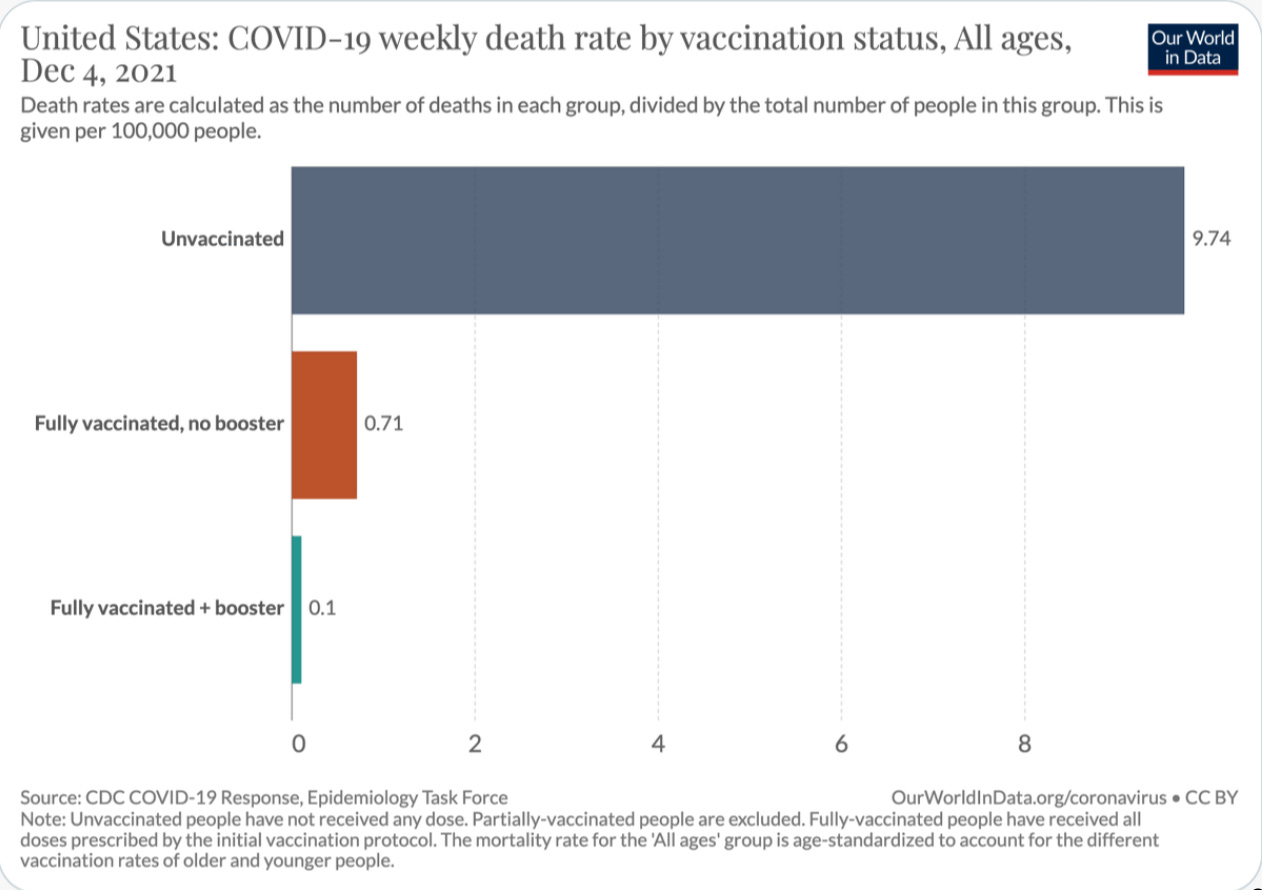CONDITION: Not Getting Vaxxed & Boosted Boosts Your Mortality Risk 100-Fold:
Scott Lemieux: The Virus Don’t Care About Your Feelings: ’Remember the Washington state trooper who told Jay Inslee to “kiss his ass” when resigning rather than taking a safe and effective vaccine to own the libs? This story has a stunning twist ending I’m sure you never anticipated: “Washington State Trooper Robert LaMay, who grabbed headlines when he blew up at Gov. Jay Inslee (D) over vaccine mandates, has died of COVID–19, KIRO news radio reported Friday…” You can’t make one of the most successful anti-public health campaigns in American history without breaking a few hundred thousand eggs…
LINK: <https://www.lawyersgunsmoneyblog.com/2022/01/the-virus-dont-care-about-your-feelings>
First: Walking the Dog in the Suburbs of Omelas
So when I headed out with the dog on Dawn Patrol this morning, I cued up the “Swords, Sorcery, & Socialism” podcast <https://podcastaddict.com/podcast/3609355>:
I mean, I am sooooo much in their target audience, and the podcast had been highly recommended to me.
But I lasted only five minutes. The vibe seemed very wrong. So I went off and listened to the superb Charlie Jane & Annalee show <https://www.ouropinionsarecorrect.com>
and to Patrick Wyman <https://patrickwyman.substack.com>:
The problem? It was just the vibe. The overwhelming bro-left vibe. The “How dare anybody actually try to do something to make a better world! Become a lanyard geek working for the UN trying to stop or shorten a war? F*** No! Dweebs! Let us radically reject! Let us show that we radically reject by smoking weed and bullshitting!” vibe.
Perhaps the real problem I had is that Ursula K. LeGuin’s “The Ones Who Walk Away from Omelas“ <https://archive.org/details/newdimensions300gard/page/n13/mode/1up> is not written to be an easy story. If your reaction is: Ones who walk away, yay! Omelas, boo!—Well, then, I do not think you have understood the story or LeGuin. I would dare say I do not think you have really read the story at all. The ones who walk away from Omelas, after all. Do they know where they are going? Ursula Le Guin will only say that they “seem to”. But it may not exist. It is less imaginable than the city of compromised happiness.
We do not know where they arrive, or if, indeed, they arrive anywhere. One powerful key that provides a way to read the story suggests that they die in the wilderness. Each of them leaves alone, without friends or companions or comrades, heading for the mountains. You do not need to be an anthropologist’s daughter to know that the chances of survival of a lone East African Plains Ape, however well-equipped, in the mountains of the Pacific Northwest are very small indeed. Another powerful key is to read it alongside J.R.R. Tolkien’s “Leaf by Niggle” <https://wp.lps.org/mpayant/files/2010/08/LEAF-BY-NIGGLE.pdf> and its ending: “They both laughed. Laughed—the mountains rang with it!” A third powerful key is to consider it as a refutation of the William James theme on which it is based: James thought the citizens of Omelas would be unable to live with themselves, and “Omelas” can be read as LeGuin pointing out that—as so much history shows—James was simply wrong for the overwhelming proportion of people. The ones who choose or find themselves forced to walk away from Omelas are few and rare.
And there are many other possible keys to the story.
Ursula K. LeGuin did, after all, construct it as a puzzle that has no answer—or, perhaps, a puzzle in which all answers are unsafe and unbearable.
Thus, in my opinion at least, if you think the story-puzzle has an answer that is bearable and safe, you have not really read the story at all—have not understood at all what it would be like to live in or visit Omelas, where “With a clamor of bells that set the swallows soaring, the Festival of Summer came to the city Omelas, bright-towered by the sea…”
But have I made a mistake? Should I give them another chance, and listen to their “Omelas” episode?
One Picture:
Very Briefly Noted:
Angélique Janssens: The Modernization of Health in the Netherlands<https://lrhmatters.com/drivers-of-health/the-modernization-of-health-netherlands-1854-1940>
Jennifer Worrel: Let’s Go Freedom: Communing Between “Let’s Go Brandon” & “Let’s Go, Darwin” <https://ordinary-times.com/2022/01/29/lets-go-freedom-communing-between-lets-go-brandon-and-lets-go-darwin/>
Adam Tooze: Team Transitory Roars Back: ‘Matt Klein on his Overshoot Substack…. About two thirds of the deviation of CPI from pre-COVID trend can be attributed to just two categories—motor vehicles and energy prices. Almost all of the excess inflation is attributable to components collectively worth one third of the overall index…
Stephen Kinsella: ’I want to tell you a story involving a friendly tractor, a Hugo Boss suit, and some shoes…

William E. Spriggs: ’Those of us who actually know what the Board of Governors do, and the qualifications of those who have held the post, need to be clear that these attacks are baseless. And we should take note of those making those claims…

Paragraphs:
Charles Wilson (1967): Trade, Society, & the State: ‘The two areas which in 1500 represented the richest and most advanced concentrations of trade, industry and wealth were the quadrilateral formed by the Italian cities Milan, Venice, Florence and Genoa; and the strip of the Netherlands that ran from Ypres north-east past Ghent and Bruges up to Antwerp. It was not merely coincidence that these were the areas where the tradesmen of the cities had been most successful in emancipating themselves from feudal interference and in keeping at bay the newer threat of more centralized political control offered by the new monarchies. In the fleeting intervals between the storms of politics and war, men here glimpsed the material advance that was possible when tradesmen were left in peace unflattered by the attentions of strategists who regarded their activities as the sinews of war…
LINK: <https://archive.org/details/cambridge-economic-history-of-europe-iv/page/n2/mode/1up>
FT Alphaville: So Long Izzy, We’ll Miss You: ‘It’s an emotional day at FT Alphaville Towers. Our beloved editor, Izabella Kaminska, is leaving after a 13-year stint at the blog. Having joined in 2008 as a junior reporter after working for Big Oil (yes, that’s right conspiracy theorists), Reuters and CNBC, Izzy rose through the ranks to finally be made head honcho in 2017, succeeding FTAV founder Paul Murphy. She will be sorely missed by all of us, and many of you. Readers will agree that there is no one quite like Izzy…. Here are some stories, and a video, from her over the years…. Whether “Fulfilled by Amazon” was at risk of being swamped by counterfeit goods due to its co-mingling policy…. Did currency debasement lead to the collapse of the Roman Empire?… Uber’s business model didn’t look sustainable…. Izzy… produced a fantastic mini-film about QAnon…. Over 2,000 words on how the Roman Empire dealt with the pirate threat to its grain supplies…. Who is Satoshi Nakamoto?…. A history of bitcoin. From 2013. Need we say more?… Izzy had a go at working for Deliveroo…. Explaining the commodity warehouse trade with scripture…. Don’t have a clue what real-time gross settlement systems are?… Solar panel prices…. There’s no better example than this post on the problem with DAOs from… six years ago…. FT Alphaville: Vaudeville…. So long Izzy, and thank you for the memories. We wish you all the best at your next endeavour…
LINK: <https://www.ft.com/content/70bfe728-5b94-49a8-9100-839b9b49417e>
Josh Barro: Why I Hate Cryptocurrency: ‘As someone who is in general more favorable to the social value of finance than a lot of commentators… I want finance to be useful, serious, and furthering the production of useful products and services in the real economy. I want banks lending for the construction of new buildings; equity markets making it possible for the most promising companies to raise funds to build useful products; bond markets making cheap and efficient financing available for public and private activities that will support payment of interest on the bonds. I was a big champion of the Fed’s actions to rescue the financial system in spring 2020 because I know a robust and liquid financial system isn’t just something people on Wall Street like—it’s something that makes it possible to get a mortgage, use a credit card, remain employed at a company, and generally enjoy all the things made possible by a modern economy. And I am concerned that tens of millions of Americans investing in a stupid market with no such thing as fundamental value… is likely to lead to significant financial dislocation and reduced trust in the financial system when a lot of them lose their shirts. So that’s why crypto bothers me and I lack a sense of humor about it…
LINK:
Adam Tooze: Team Transitory Roars Back: ‘Joe Weisenthal at Bloomberg has been tracking the supply chain story as closely as anyone. He remains unconvinced that we are facing anything more than a transitional shock. So what exactly is overheating? What’s “too hot?” The most plausible answer is that the speed with which we’ve returned to normal is extremely fast, and that’s taxing the system as a whole. This seems reasonable. It has been an extraordinary rapid bounce back, at least from the perspective of past downturns. And not only has the bounce back been very rapid, consumption patterns have changed amid the bounce back. As everyone knows by now, people are buying a lot more “stuff” relative to services, and as such the price of durable goods has shot up. One takeaway from all this is that it may be too soon to bury the t-word, “transitory.” Sure, nobody uses the word anymore. Most people seem to be too embarrassed to even say it out loud. But there are still reasons to think that the big upward pressure we’ve seen in prices is related to the rapid journey back to trend and the shift in consumer demand. And it’s important to remember that the rapid journey back to trend is a good thing…
LINK:
Ryan Avent: The Fed Looks Increasingly Determined to Make a Major Policy Error: ‘And to miss a golden opportunity…. The costs of making a dovish error are substantially lower than the cost of making a hawkish error. If you tighten too little, then a year from now inflation is higher than you’d like it to be, which annoys people and imposes some small efficiency costs across the economy, but at least you have all the tools you need to address the problem. If you tighten too much then a year from now employment is lower than it otherwise would be, which is more than a mere annoyance and which is likely to involve economic costs substantially larger than those associated with an inflation overshoot. Oh, and there may not be much you can do about it…. There were thus very good reasons for the Fed to be patient last year as inflation rose…. I am skeptical that the Fed will actually find itself able to go through with all of this, but if it does it will pack into about one year what took roughly four during the last tightening cycle. In doing this, the Fed has given itself very little margin for error…
LINK:
Duncan Weldon: It’s All Relative: ‘The recent increase in inflation is really a result of changing relative prices rather than a generalised rise. That has important implications for policy…. The fraction of the overall inflation variability attributable to the common inflation component drops sharply, from over 50% to between 15 and 30%, once the pre–1980 period of high and volatile inflation drops out of the estimation window…. Monetary policy operates on a surprisingly narrow range of prices…. The sectors whose prices are responsive to marginal adjustments in the stance of policy have a relatively small weight in the overall price index…
LINK:











Do I agree with your reading of Le Guin? Sic et non. Sic: absolutely, the ones who walk away from Omelas are walking toward an uncertain and risky fate; perhaps toward their doom. Non: I believe that Le Guin is passing a clear and unambiguous moral judgment between those who leave and those who stay, and that those who stay are found wanting. What she is saying is that staying is comfortable and understandable and human, whereas leaving is dangerous, the destination unknown, and the way hard; but it is the better course.
She made the same judgment between Anarres and Urras in The Dispossessed; and yet the subtitle of that book is "An Ambiguous Utopia". But in her introduction to the Hainish Cylce omnibus, she makes it clear that it *is* meant as a utopia (there is a helpful fragment of this in the Wikipedia entry: https://en.wikipedia.org/wiki/The_Dispossessed#Background.)
All this is the opposite of the "“how dare anybody actually try to do something to make a better world!", though, so if that is truly the vibe of your podcast, then I think you would be wasting your time with it.
I'm just getting a bunch of blank spaces in my browser where you refer to Anders/Newitz and so on. So I have no real idea what you're responding to at the moment. But they're each separately worth paying attention to, and, presumably, also jointly. Probably even if, or particularly when, they are, or seem, seriously wrong. I can certainly imagine they have chosen their side at Omelas, and I can imagine why. LeGuin may not answer her question, but the title suggests not only that there is a question, but that those to whom it is posed (i.e., everybody ...) will need to answer it - cannot avoid answering it.
Possibly somewhat apropos, distantly - The Actual Star is very striking.
As cartoons go, I prefer "Proving the existence of fish" which Google will be happy to show. Though I suppose it is less relevant to economics.